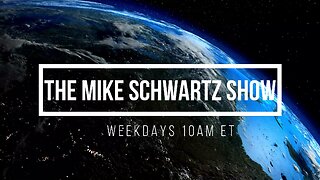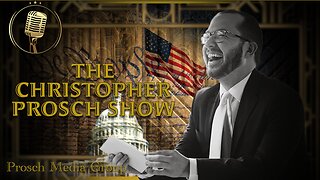Premium Only Content

Eliza Pinckney Tells Her Story as a 16 Year Old Plantation Owner and Mother of a Founding Father
Presented to you by: http://www.HistoricalConquest.com
Read more on our blog at: https://www.historicalconquest.com/blog
My name is Eliza Lucas Pinckney, and though my story took place in colonial South Carolina, I believe it’s one you might find surprising and inspiring. I wasn’t a politician or a soldier, but my work in agriculture helped change the economy of the American colonies. Let me tell you about my life and how a young girl ended up shaping an entire industry.
I was born in 1722 on the Caribbean island of Antigua. My father, George Lucas, was a British military officer, and we were part of a respectable family. However, when I was young, my family moved to South Carolina to manage some plantations my father had acquired. At the time, my mother was very ill, and soon after, my father was called back to Antigua due to his duties. This left me, at just 16 years old, in charge of our three plantations in South Carolina. Can you imagine? I was only a teenager, and yet I was responsible for overseeing hundreds of acres of land, dealing with crops, and managing the enslaved people who worked for us.
I had always been interested in plants and agriculture. Even as a young girl, I read everything I could about botany and experimented with growing different plants. South Carolina’s economy at the time relied heavily on rice and a bit of indigo, which was used to make a blue dye for fabric. I saw an opportunity with indigo, as it was highly valued in Europe, yet it was difficult to grow and process in the colonies. Many people had tried and failed to make indigo a profitable crop here, but I was determined to succeed.
With the help of enslaved workers who had knowledge of agriculture, I began experimenting with indigo on our plantations. It took a lot of trial and error, and there were many setbacks. The process of growing indigo was challenging because it required just the right conditions, and the dye-making process was complex. But after several years of experimenting, I finally developed a strain of indigo that thrived in South Carolina's climate. This breakthrough didn’t just benefit my family; it changed the entire economy of the colony. Soon, indigo became one of South Carolina's biggest exports, second only to rice. By the time of the American Revolution, indigo was bringing in hundreds of thousands of pounds for the colonies.
But agriculture wasn’t my only passion. I valued education, and I made sure my children were well-educated. I encouraged my sons to serve their country and helped instill in them a sense of duty. One of my sons, Charles Cotesworth Pinckney, would go on to be a Founding Father and help shape the United States. I like to think that my influence played a part in his dedication to public service.
In my later years, I continued to manage our lands and contribute to our community. Even after my husband Charles Pinckney passed away, I carried on the work he and I had started together. I believed that a woman could be just as capable as a man in business, agriculture, and even politics, even though society didn’t often see it that way.
Looking back, I’m proud of what I accomplished. I hope my story shows that determination and a willingness to learn can open doors, even in unexpected places. Whether you’re interested in science, business, or any other field, remember that there’s always room to innovate and make a difference.
Visit us at: https://www.historicalconquest.com/marketplace
#historicalconquest #history #historical #RevolutionaryWar #AmericanRevolution #AfricanAmerican #BlackAmerican #Freedom #Slavery #Liberty #Independence #Justice #Freedom #colonialera #colonialamerica #constitution #usconstitution #unitedstates #unitedstatesofamerica #womeninhistory #women
-

The Rubin Report
1 hour agoCrowd Shocked by Ben Affleck’s Unexpected Take on This Massive Change
24.7K11 -
 2:07:25
2:07:25
Steven Crowder
3 hours agoBREAKING: Russia Launches ICBM for First Time in History - What Happens Next?
297K157 -
 LIVE
LIVE
The Shannon Joy Show
4 hours ago🔥🔥While Americans Are Watching WWE Politics: Australia Is Ramping Up MANDATORY Digital ID🔥🔥
421 watching -
 LIVE
LIVE
LFA TV
14 hours agoTHE FIGHT IN ONLY BEGINNING! | LIVE FROM AMERICA 11.21.24 11am EST
5,631 watching -
 1:18:10
1:18:10
Graham Allen
4 hours agoPutin Vows Peace With Trump But WAR Under Biden!! + 400,000 Kids Are MISSING?!
97.6K163 -
 2:11:07
2:11:07
Matt Kohrs
12 hours agoMSTR Squeezes Higher, Bitcoin To $100k & Nvidia Post Earnings || The MK Show
30.3K1 -
 42:07
42:07
BonginoReport
6 hours agoNikki Haley's Hatred of Tulsi Gabbard Just Made Me a Bigger Fan (Ep.90) - 11/21/24
98.5K199 -
 28:41
28:41
Professor Nez
11 hours ago🚨BLOOD on their HANDS! The Man Biden & Kamala Flew In Finally Faces JUSTICE for Laken Riley
50.7K26 -
 1:06:27
1:06:27
2 MIKES LIVE
3 hours agoThe Mike Schwartz Show 11-21-2024
58.5K -
 15:07
15:07
PMG
13 hours ago $0.69 earned"President Trump's Cabinet is Amazing!"
61.2K